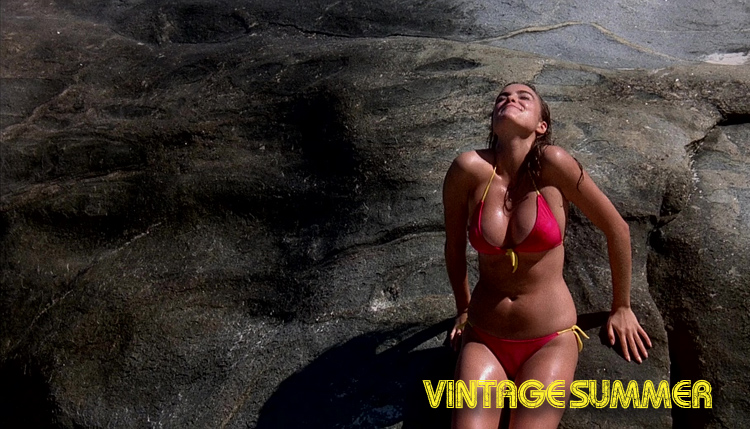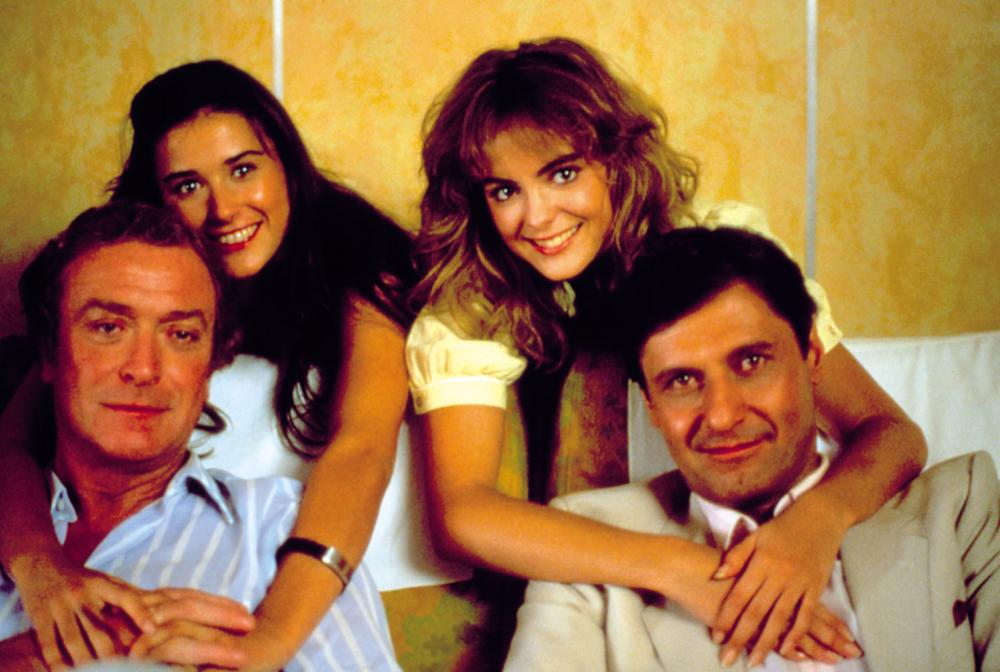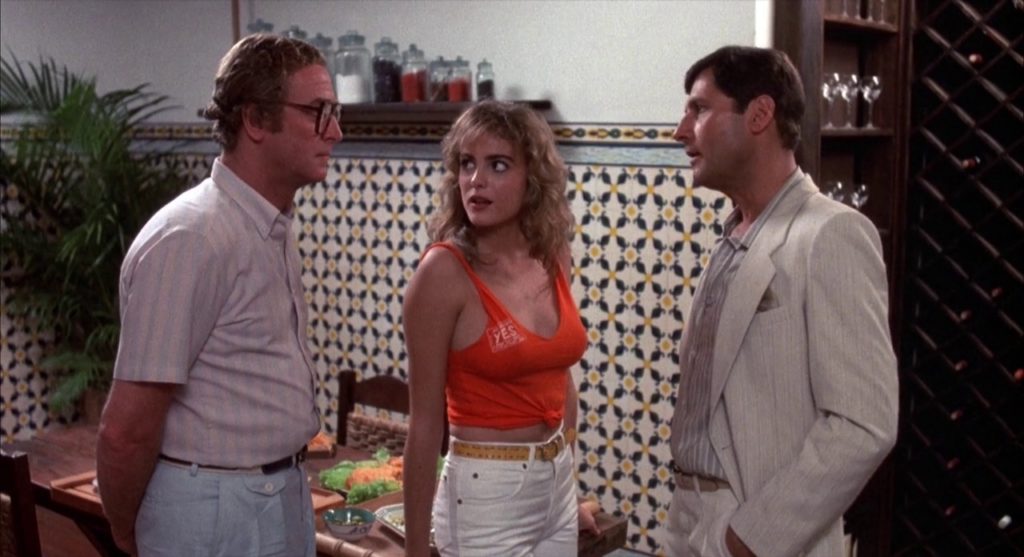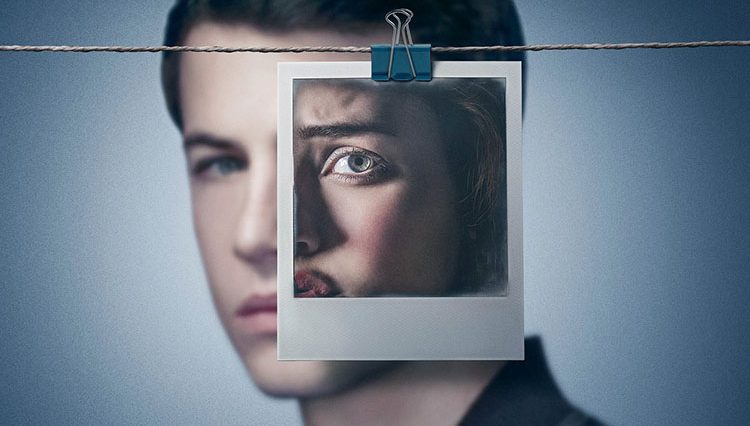
“One time a company I worked for transferred me to an island in the Pacific. Fantastic place. I invited my girl to visit me. I sent her a postcard everyday with a single word on each card. I wrote “Found a virgin paradise. It’s yours. Matthew.” Naturally, they were delivered in the wrong order. The message she got was “Found a virgin. It’s paradise. Yours, Matthew.” Never heard from her again.”
Blame It on Rio, 1984 (Michael Caine), 20th Century Fox
This is a tough one. It’s a film I enjoy, but only in private. This is a movie I find I cannot share with today’s younger audiences, either because they can’t grasp the concept of a truly R-rated sex comedy that skirts topics considered forbidden, or because of it’s simultaneously dated yet timeless feel. Let’s get the hotness of Michelle Johnson out of the way first. She’s supposed to be a teen-aged girl, but upon inspection, she appears mature. She looks like a woman, not a girl. Once you’ve taken that fact and put it in a box, it’s easy to enjoy Blame It on Rio, the definitive romantic jailbait comedy.
Michael Caine stares down the barrel of middle-age, trapped in a loveless marriage (to Valerie Harper, can you blame him?) and worries after his reckless daughter (Demi Moore, whom apparently inherited her scratchy-voice from Harper) when his friend (a constipated Joseph Bologna) suggests a family vacation to titular Rio de Janeiro. Nothing to worry about. Just a couple of dads and their hot daughters going stag for a couple of weeks. After witnessing Bologna’s daughter topless on the beach (with his equally-bare daughter, which is … just yuck), she seduces him, and despite all his efforts at restraint, he succumbs.

Caine spends most of the movie after this point trying to avoid the girl. She casts love spells on him. He tries to make himself less appealing (which is impossible because come on, he’s Michael-freaking-Caine!) and he lectures her on their illicit behavior. She doesn’t care. She’s hopelessly in love with him. Bologna snoops through his daughter’s diary, discovers she’s in love with an older man and enlists Caine to help him find the scumbag. Caine is a joy to watch in these scenes. A gifted comedian in the Peter Sellers and (our old friend) Dudley Moore mold, he can go from terrified to turned-on in five seconds.
Michelle Johnson is a difficult actress to assess. While extremely attractive, and obviously up to the game of seducing Caine, most of her dialogue is looped and thus, inconsistent with many of the scenes in which she is featured. Her voice is silky, but out-of-place. She has great chemistry with Caine (not an arduous feat for an actor of his stature), but her line readings are dull and flat. Bologna suffers the same problem. His dialogue also appears to be looped. Valerie Harper disappears at the beginning of the movie and then reappears shortly before the end to discover (with Bologna, ironically the character she’s having an affair with) Caine and Johnson’s tryst. Demi Moore’s character is almost a ghost in the movie, always exiting in every scene. The movie would’ve been a lot stronger if more of a relationship between Moore’s character and Caine were present.
It is toward the end of the movie that the narrative goes clunky and dramatic. When Bologna and Caine come to blows (a hilarious bit with pot-bellied Caine taking on a much leaner Bologna – pun!), a distraught Johnson overdoses on birth control pills and has her stomach pumped at the hospital. Director Stanley Donen (fresh from the horrendous Saturn 3) and writers Larry Gelbart and Charlie Peters must’ve thought injecting a little pathos into the story would legitimize what is essentially a smutty little sex comedy. It might’ve worked under different circumstances in the 1977 French film, on which this movie is based (or Jean-Francois Richet’s somewhat more explicit recent remake), but here, amid all the goofiness, this is quite jarring.

It’s disturbing to me that a movie like this could not be made today in this country. As I mentioned, it was remade last year in France, but as a drama with humorous moments rather than a screwball comedy. It harkens back to the days of Kubrick’s melodramatic and comedic take on Nabokov’s Lolita, in which much of the sting of the story’s content was sterilized by the casting of a mature-looking Sue Lyons. Today, men are perceived as aggressors, and rapists and women are seen as victims, regardless of their age. Audiences would see Michael Caine’s character as a modern-day Clare Quilty; a master manipulator of young women who seduces Michelle Johnson, regardless of how the story actually unfolds. Caine would be castigated, arrested, and labeled a sex offender for the rest of his life. Advocacy groups would picket and protest this movie.
In the 1980s, most of the money in movies was being made from sex comedies and horror films. Conversely, there were very few family movies. Cable television and the video industry were going through a renaissance period, and budgets were comparatively low compared to the money being spent today. The risqué sexy comedy is all-but-extinct, and movies being made these days are sad, stale (not to mention expensive), disposable entertainments to be consumed and then discarded, and Blame It on Rio is emblematic of the charms of a smutty yet harmless bye-gone era.




